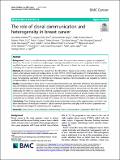Por favor, use este identificador para citar o enlazar a este item:
http://hdl.handle.net/10261/185584COMPARTIR / EXPORTAR:
 SHARE SHARE
 CORE
BASE CORE
BASE
|
|
| Visualizar otros formatos: MARC | Dublin Core | RDF | ORE | MODS | METS | DIDL | DATACITE | |

| Campo DC | Valor | Lengua/Idioma |
|---|---|---|
| dc.contributor.author | Martín-Pardillos, Ana | - |
| dc.contributor.author | Valls Chiva, Ángeles | - |
| dc.contributor.author | Bande Vargas, Gemma | - |
| dc.contributor.author | Hurtado Blanco, Pablo | - |
| dc.contributor.author | Piñeiro Cid, Roberto | - |
| dc.contributor.author | Guijarro, Pedro J. | - |
| dc.contributor.author | Hümmer, Stefan | - |
| dc.contributor.author | Bejar Serrano, Eva | - |
| dc.contributor.author | Rodriguez-Casanova, Aitor | - |
| dc.contributor.author | Díaz-Lagares, Ángel | - |
| dc.contributor.author | Castellvi, Josep | - |
| dc.contributor.author | Miravet-Verde, Samuel | - |
| dc.contributor.author | Serrano, Luis | - |
| dc.contributor.author | Lluch-Senar, María | - |
| dc.contributor.author | Sebastián, Víctor | - |
| dc.contributor.author | Bribián, Ana | - |
| dc.contributor.author | López-Mascaraque, Laura | - |
| dc.contributor.author | López-López, Rafael | - |
| dc.contributor.author | Ramón y Cajal, Santiago | - |
| dc.date.accessioned | 2019-07-07T03:48:56Z | - |
| dc.date.available | 2019-07-07T03:48:56Z | - |
| dc.date.issued | 2019-07-05 | - |
| dc.identifier.citation | BMC Cancer 19(1): 666 (2019) | - |
| dc.identifier.uri | http://hdl.handle.net/10261/185584 | - |
| dc.description.abstract | [Background] Cancer is a rapidly evolving, multifactorial disease that accumulates numerous genetic and epigenetic alterations. This results in molecular and phenotypic heterogeneity within the tumor, the complexity of which is further amplified through specific interactions between cancer cells. We aimed to dissect the molecular mechanisms underlying the cooperation between different clones. | - |
| dc.description.abstract | [Methods] We produced clonal cell lines derived from the MDA-MB-231 breast cancer cell line, using the UbC-StarTrack system, which allowed tracking of multiple clones by color: GFP C3, mKO E10 and Sapphire D7. Characterization of these clones was performed by growth rate, cell metabolic activity, wound healing, invasion assays and genetic and epigenetic arrays. Tumorigenicity was tested by orthotopic and intravenous injections. Clonal cooperation was evaluated by medium complementation, co-culture and co-injection assays. | - |
| dc.description.abstract | [Results] Characterization of these clones in vitro revealed clear genetic and epigenetic differences that affected growth rate, cell metabolic activity, morphology and cytokine expression among cell lines. In vivo, all clonal cell lines were able to form tumors; however, injection of an equal mix of the different clones led to tumors with very few mKO E10 cells. Additionally, the mKO E10 clonal cell line showed a significant inability to form lung metastases. These results confirm that even in stable cell lines heterogeneity is present. In vitro, the complementation of growth medium with medium or exosomes from parental or clonal cell lines increased the growth rate of the other clones. Complementation assays, co-growth and co-injection of mKO E10 and GFP C3 clonal cell lines increased the efficiency of invasion and migration. | - |
| dc.description.abstract | [Conclusions] These findings support a model where interplay between clones confers aggressiveness, and which may allow identification of the factors involved in cellular communication that could play a role in clonal cooperation and thus represent new targets for preventing tumor progression. | - |
| dc.description.sponsorship | SRYC acknowledges support from Fondo de Investigaciones Sanitarias (FIS; PI17/02247 and PI14/01320), Centro de Investigación Biomédica en Red de Cáncer (CIBERONC; CB16/12/00363) and Generalitat de Catalunya (AGAUR; 2017 SGR 1799 and 2014 SGR 1131). AMP is funded by a FP7 Marie Sklodowska-Curie COFUND program under Grant Agreement n° 267128 (INCOMED program). ADL is funded by a “Juan Rodés” contract (JR17/00016) from ISCIII. | - |
| dc.language.iso | en | - |
| dc.publisher | BioMed Central | - |
| dc.relation | info:eu-repo/grantAgreement/EC/FP7/267128 | - |
| dc.rights | openAccess | - |
| dc.subject | Tumor | - |
| dc.subject | Breast | - |
| dc.subject | Cancer | - |
| dc.subject | Metastasis | - |
| dc.subject | Heterogeneity | - |
| dc.subject | Clone | - |
| dc.subject | Communication | - |
| dc.subject | Cooperation | - |
| dc.subject | MDA-MB-231 | - |
| dc.title | The role of clonal communication and heterogeneity in breast cancer | - |
| dc.type | artículo | - |
| dc.identifier.doi | 10.1186/s12885-019-5883-y | - |
| dc.description.peerreviewed | Peer reviewed | - |
| dc.relation.publisherversion | https://doi.org/10.1186/s12885-019-5883-y | - |
| dc.relation.publisherversion | Publisher's version | - |
| dc.identifier.e-issn | 1471-2407 | - |
| dc.date.updated | 2019-07-07T03:48:56Z | - |
| dc.rights.license | http://creativecommons.org/licenses/by/4.0/ | - |
| dc.contributor.funder | Generalitat de Catalunya | - |
| dc.contributor.funder | Instituto de Salud Carlos III | - |
| dc.contributor.funder | European Commission | - |
| dc.relation.csic | Sí | - |
| dc.identifier.funder | http://dx.doi.org/10.13039/501100002809 | es_ES |
| dc.identifier.funder | http://dx.doi.org/10.13039/501100000780 | es_ES |
| dc.identifier.funder | http://dx.doi.org/10.13039/501100004587 | es_ES |
| dc.identifier.pmid | 31277602 | - |
| dc.type.coar | http://purl.org/coar/resource_type/c_6501 | es_ES |
| item.openairetype | artículo | - |
| item.grantfulltext | open | - |
| item.cerifentitytype | Publications | - |
| item.openairecristype | http://purl.org/coar/resource_type/c_18cf | - |
| item.fulltext | With Fulltext | - |
| item.languageiso639-1 | en | - |
| Aparece en las colecciones: | (IC) Artículos | |
Ficheros en este ítem:
| Fichero | Descripción | Tamaño | Formato | |
|---|---|---|---|---|
| role_clonal_communication_heterogeneity_breast_cancer.pdf | 11,35 MB | Adobe PDF |  Visualizar/Abrir |
CORE Recommender
PubMed Central
Citations
26
checked on 09-abr-2024
SCOPUSTM
Citations
34
checked on 16-abr-2024
WEB OF SCIENCETM
Citations
33
checked on 23-feb-2024
Page view(s)
343
checked on 19-abr-2024
Download(s)
183
checked on 19-abr-2024

